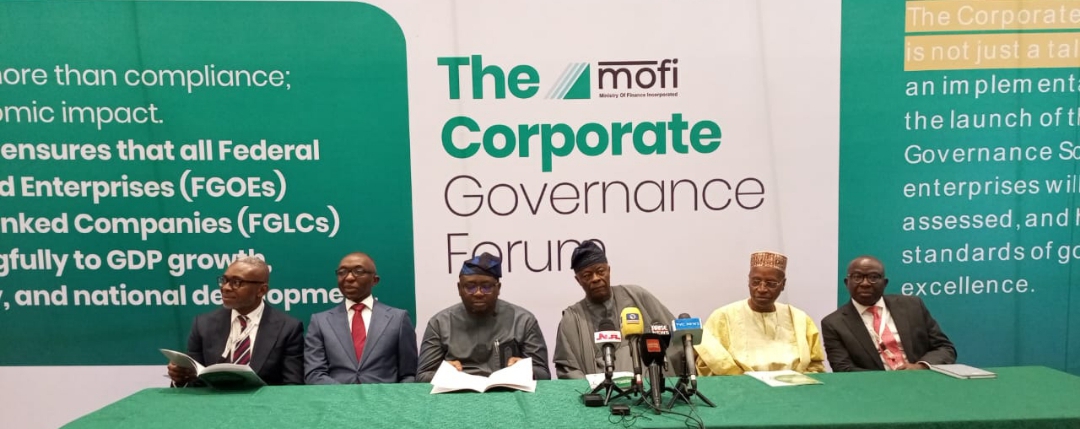FG institutes mechanism to assess performance of state-owned enterprises
By Nana Musa
The Minister of Finance and Coordinating Minister of the Economy, Mr Wale Edun, says the Federal Government has instituted a mechanism to assess, monitor, and enhance the performance of State-Owned Enterprises (SOEs) in Nigeria.
Edun made this known at the inauguration of the Corporate Governance Scorecard, organised by the Ministry of Finance Incorporated (MOFI) in partnership with the World Bank, on Monday in Abuja.
The theme of the event was “Ensuring Value Creation in State-Owned Enterprises Through Better Corporate Governance.”
According to the minister, the initiative aims to improve transparency, accountability, and efficiency in the management of public resources.
He added that the newly implemented mechanism would focus on evaluating SOE performance, identifying areas for improvement, and implementing reforms to boost productivity.
“State-Owned Enterprises (SOEs) form a critical component of the national economic framework.
“They wield considerable influence across key sectors, including energy, infrastructure, telecommunications, and financial services.
“However, their potential to drive economic expansion, job creation, and industrial growth has often been limited by inefficiencies, poor financial management, and, in some cases, governance shortcomings.
“The question, therefore, is not whether SOEs should continue to exist, but rather how they can be repositioned to better fulfill their mandates.
“In this context, corporate governance assumes an indispensable role,” he said.
Edun explained that for SOEs and government-linked entities, a robust governance framework was essential to ensure public resources were properly managed, financial discipline was maintained, and operational efficiency was achieved.
“The government, through MOFI, recognises this and has embarked on strategic reforms to reposition SOEs for value creation.
“MOFI is tasked with serving as an active asset manager for the Federal Government, ensuring the professionalisation, optimisation, and efficient administration of government-owned enterprises.
“With the MOFI corporate governance scorecard initiative, the government is putting in place a mechanism to assess, monitor, and enhance the performance of its SOEs,” Edun said.
Also speaking at the event, the Minister of Power, Mr Adebayo Adelabu, noted that SOEs played a central role in delivering public services, creating value, and supporting economic development.
Adelabu, however, said that the evolving complexities of Nigeria’s economy, technological disruptions, and increasing public expectations had highlighted the urgent need for transformation, particularly in how these enterprises were governed.
“The transformation of state-owned enterprises, particularly in how they are governed, is a critical agenda.
“For us in the power sector, this imperative is neither abstract nor optional,” the minister stated.
“It is urgent, necessary, and already underway.
“One of the most significant structural reforms in recent times has been the unbundling of the transmission company of Nigeria into two distinct operational entities.
“This move is not merely administrative; it reflects our commitment to fostering operational clarity, transparency, and ultimately, value creation through better corporate governance,” he said.
The minister emphasised that to deliver on these mandates effectively, each entity must be governed with integrity, independence, and accountability.
According to him, sound corporate governance will not only ensure operational excellence but also boost investor confidence, facilitate regulatory compliance, and safeguard the public interest.
Adelabu further said that the launch of the corporate governance scorecard and the pilot assessment represented important steps toward building a culture of performance and transparency across the public enterprise landscape.
He noted that good corporate governance was essential for national competitiveness, financial sustainability, and inclusive service delivery in Nigeria’s power sector.
The Chairman of the MOFI Board, Dr Shamsuddeen Usman, said that all board members and management had adopted a corporate governance code of ethics and professionalism.
“It insists that we must not allow personal interests to interfere with our work. Every member of the board and management have signed this undertaking.
“We have put in place measures to ensure transparency and boldness in our approach. This is significant, as it lays the foundation for strong corporate governance,” he said.
Usman added that the details of how the scorecard would be used and how assessments would be conducted would be handled by independent third parties.
The World Bank Country Director for Nigeria, Mr Ndiame Diop, noted that SOEs not only played critical roles in high-risk private investments but also support the acceleration of economic transformation.
“It is truly fortunate that Nigeria possesses a large portfolio of strategic assets that can be leveraged to achieve development goals.
“In Nigeria, SOEs are active across many sectors, including power, agriculture, and financial services.
“Given their presence in these sectors, they have the potential to significantly boost economic growth.
“At the same time, they contribute meaningfully to government revenue,” he said.(NAN) (www.nannews.ng)
Edited by Kevin Okunzuwa






